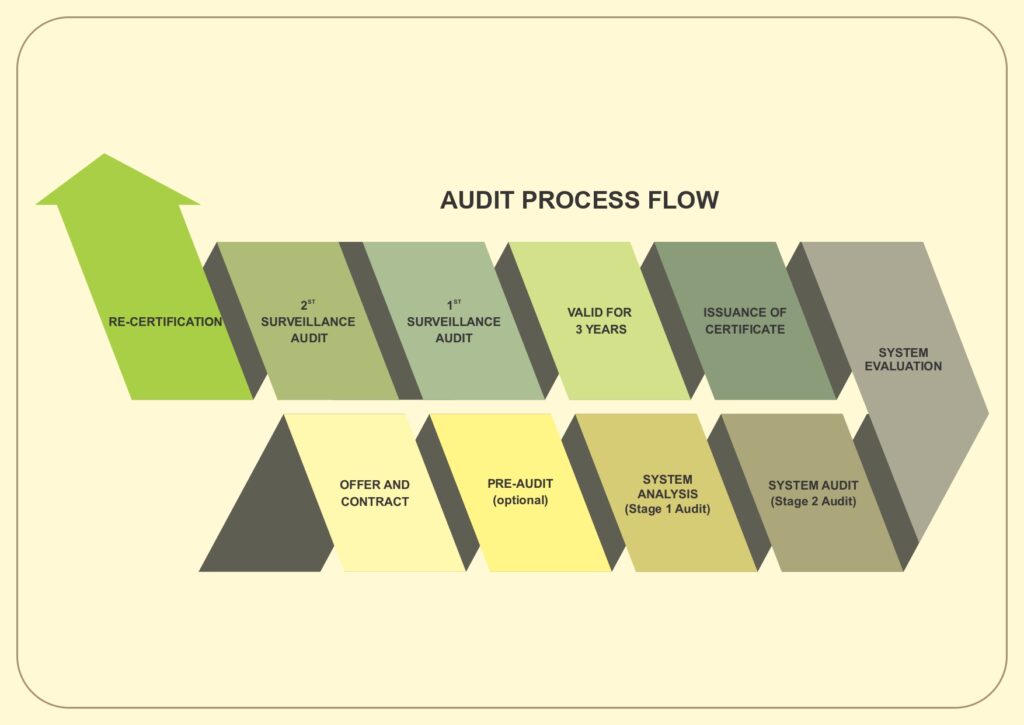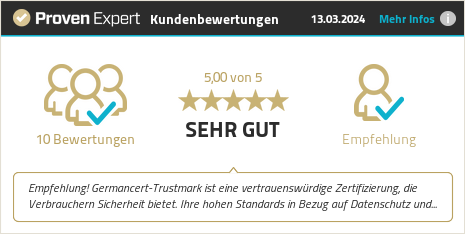Audit and Certification Services
During a GERMANCERT audit, qualified and experienced GERMANCERT auditors review the management system and its processes for ongoing suitability and effectiveness in light of changing markets and environment, with the goal of determining its conformity with agreed and acknowledged requirements, such as international, national or sector-specific standards or specifications.
The respective audit process may involve one or more steps, usually ending with an audit report, which documents the audit results. In the case of certification services
GERMANCERT will issue a customer-specific certificate, confirming conformity to the respective requirements, when the fulfillment of all applicable requirements has been evident. By identifying strengths, improvement potential and non-conformities auditors enhance the organization’s ability to meet established goals and objectives, thus enhancing sustainable success for the client. With a GERMANCERT certificate customers may place confidence on the client and the certified management system, which has been assessed and certified to recognized standards and specifications.
GERMANCERT auditors are independent, neutral and objective in their audit activities. Audits are normally performed at client’s place of operations. The type, extent and date of the audits are subject to separate agreements between GERMANCERT and its clients.
Audit Process Steps
The audit process includes generally the following steps:

- Identification of the client’s needs and expectations:
GERMANCERT wants to learn about the client’s organization, its management system, size and types of operation. Together both parties will define scope and objectives for the audit and/or certification, including applicable standards and specifications.
- Quotation and contract:
GERMANCERT provides a detailed offer for audit and certification services, tailored to individual client needs, based on the information provided initially. A written contract will specify all relevant deliverables as well as applicable audit and certification criteria.
- Pre-audit (optional):
A pre-audit can serve as initial performance or gap analysis, identifying strengths and areas for improvement. For larger audits and certification projects a project planning meeting provides a valuable opportunity for the client to meet the lead auditor and develop a customized assessment plan for all functions and locations involved.
- Stage 1 audit (system analysis):
The audit procedure begins with review and evaluation of system documentation, goals, results of management review and internal audits. During this process, it will be determined whether the client’s management system is sufficiently developed and ready for certification. The auditor will explain findings and coordinate any required activities to prepare for the on-site system assessment.
- Stage 2 audit (system audit):
The assigned auditor team will audit the client’s management system at the place of production or service delivery. Applying defined management system standards and specifications, the audit team will evaluate the effectiveness of all functional areas as well as all management system processes, based upon sampling, observations, inspections, interviews, review of pertinent records, and other auditing techniques. The audit result, including all findings will be presented to the client during the closing meeting. Required action plans will be agreed upon as necessary.
- System evaluation:
The independent certification function of GERMANCERT will evaluate the audit process and its results, and decide independently about issuance of the certificate. The client receives an audit report, documenting the audit results. When all applicable requirements are fulfilled the client also receives the certificate.
- Surveillance audits:
Ensuring ongoing validity of the certification, there will be an on-site audit of the critical components of the management system at least once per year. Improvement potential will be identified, with a focus on continual improvement and sustained effectiveness.
- Recertification audit:
A management system certificate is valid for a limited period of time, frequently for a maximum of three years. At the end of this cycle, a recertification audit will be carried out to ensure the ongoing fulfillment of all applicable requirements. Subject to this fulfillment, a new certificate will be issued. In certain cases, additional steps or audit types may apply (e.g. special audits, transfer audits). During the whole audit process the auditor has a key function and is responsible to perform different auditing activities, e.g. audit preparation, presentations, audit planning, document reviews, on-site auditing, follow up activities, reporting. If necessary, the auditor reviews the scope of the audit in cooperation with the client at the appropriate stage. The auditor may propose changes to the audit duration to GERMANCERT, which in turn takes such decision and notifies the client accordingly. The auditor however, is not entitled to make binding agreements with the client with respect to the audit duration or change of existing quotations. Whenever possible, the auditor will be assigned to carry out all applicable stages over a three years period in order to ensure a continuous audit process for the client. All details related to a specific audit are agreed in writing by the auditor and GERMANCERT. These include audit duration, location and commercial conditions.
9- Extending or limiting the scope of certification
Any change in certification scope must be accepted by lead auditor, according to an onsite audit including: certification, surveillance, recertification and special audit. Man/day calculation or any other change in client contract must be done according to UNTERNEHMENSDIREKTIVE AUDITIERUNG








